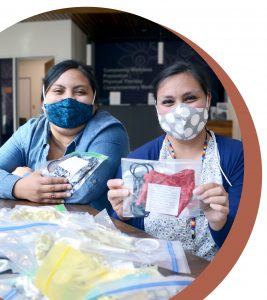
Yellowhawk Tribal Health Center is excited to share that the Behavioral Health department will be opening a new Sober Transitional Housing program. The program will offer wrap-around services and a supportive and structured home environment for those in recovery. Two modular homes will house program participants. One of those is the former Fishery/Systems of Care Building and the other is in process of being purchased. Despite unexpected hurdles from the flood and recent challenges due to COVID-19, the program is on schedule to open this year.
Nancy Kirksey, Behavioral Health Administrative Assistant, has been working to make sure this program is up and running on a tight schedule. The program is being funded in part by CTUIR Wellbriety, State Opioid Response, State Targeted Response, and Tribal Opioid Response grants, some of which have limited timeframes for fund distribution. Nancy’s connection to this program runs deep, as her mother worked in the sober housing program that once occupied the T-House on the CTUIR.
Nancy shares, “I’m feeling blessed to be a part of this project as it holds a special place in my heart. Carol Gray-Kirksey, my mother, worked there when I was a child, did grocery shopping, set up groups, and was the last to close the door in the 80s.”
Like Nancy’s connection with the Sober Transitional Housing, the Confederated Tribes of the Umatilla Indian Reservation (CTUIR) Board of Trustees (BOT) has a longstanding connection to supporting recovery and sober living. In 2007, the BOT’s Alcohol and Drug Task Force created an Action Plan which proposed addressing alcohol and drug issues through research, prevention, and treatment. Yellowhawk’s Sober Transitional Housing is intended to be a part of the treatment plan for American Indians and Alaskan Natives who are in recovery. The Board of Trustees approved Resolution 20-031 on April 13, 2020 supporting the program. The CTUIR Health Commission placed Sober Transitional Housing in the 2020 Annual Work Plan, making Yellowhawk staffing resources available for this project. We looking forward to sharing more about this program over the coming months.


Keeping the Community Safe: Mask Making
The Native Connections program at Yellowhawk Tribal Health Center is working to support the health of the community by providing masks for Yellowhawk essential staff and the Confederated Tribes of the Umatilla Indian Reservation (CTUIR). Native Connections provided the materials while Dolores Jimerson, Sierra James, and Shoshoni Walker helped with identifying which mask designs met the Centers for Disease Control and Prevention (CDC) guidelines and cutting masks to sew. Ashley Harding, J’Shon Thompson, Syreeta Azure, Shawndine Jones, and Anne Sokoloski took up their sewing machines, producing 130 masks in various sizes, styles, and colors. Masks will be provided to essential workers at Yellowhawk and the remaining masks will be shared with the community during the food distribution .
If you wish to make your own masks there are several different designs to choose from. These include sew and no sew options. To find more information on mask making, wearing and care instructions see the CDC website.
You can see up-to-date COVID-19 testing information for Yellowhawk on our website www.yellowhawk.org.![]()
